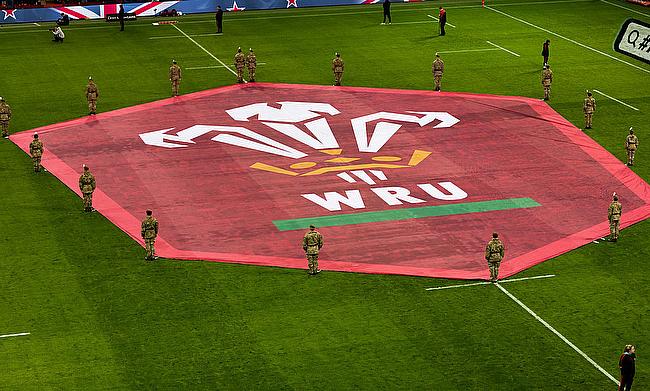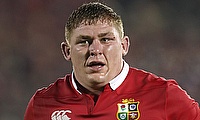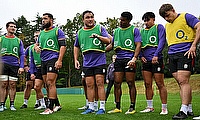Welsh players may strike in contract dispute for England game

Wales player may strike for their clash with England as a result of a contract dispute between the WRU and the regions
©Sian Owens
England’s visit to Wales in the third round of Guinness Six Nations action has been called into doubt as Wales players threaten to strike in contract dispute.
Players are considering this stunning action as they look for clarity in regards to their future. Within the next week, Wales players will hold a meeting where the possibility of strike action will be put onto the table.
This season, the Welsh Rugby Union [WRU] and the four professional regions - Cardiff Rugby, Dragons RFC, Scarlets and Ospreys - in the country have been in a deadlock over future budgets and has impacted players securing new contracts already and plunging the futures of many into uncertainty.
On Tuesday, Sportsmail delved into the impact that this has had on players, with a current Wales international telling Alex Bywater that he was on antidepressants and is unable to apply for a mortgage as a result of the stand-off.
Now facing a mass-exodus of players, it is another nail in the governing body’s coffin after entering the Six Nations in the shadow of sexism, misogyny and racism claims which were aired in a BBC Wales Investigates programme in January.
A Welsh Rugby Players Association [WRPA] statement released in December focused on players wellbeing being severely impacted by the delay in an agreement being made, something which will surely have intensified in the weeks that have followed.
Imploring the WRU and the regions to come to an agreement then, the continuing lack of cooperation between all the parties involved has led to the potential for players to take industrial action.
It is said to have had an impact within Warren Gatland’s squad, the distraction caused by the precariousness of the saga causing a general sense of unease within the group.
In December, two days after the WRPA’s statement, it was announced 23-cap lock Will Rowlands decided that his future lay outside of Wales in signing a lucrative contract with Top 14 club, Racing 92 for the start of next season.
Instantly made unavailable for Wales selection as a result of their 60-cap policy, it is possible that others may follow suit should they choose to. Wales full-back, Liam Williams [83 caps], has been linked with a move to Japan, while Scarlets duo Leigh Halfpenny and Rhys Patchell seem set to move on.
When asked on Tuesday, Cardiff Rugby coach Dai Young said that the powers that be cannot be ‘arrogant’ in thinking that players would not entertain interest from elsewhere just to continue playing for Wales.
"I'm sure a lot of countries will be monitoring the situation in Wales over the next month or so and more than happy to take our best players," Young said.
"I don't think you could ever underestimate the power of the Welsh jersey - every kid growing up in Wales wants to play for Wales - but we shouldn't be arrogant in that either.
"You'd have to respect players' decisions because we've all got families and mortgages to look after."
Players have been said to have been offered fixed variable contracts, those contracts providing a basic wage that would be added to with bonuses.
Banded into tiers, the majority would earn sums between £30,000 and £100,000, with the highest basic salary that a player could receive is £278,000.
That would be a significant reduction for Wales’s top players, who currently earn £400,000 a year. Potentially contributing to the shrinking of regional squads and see players left without work.
It has also been reported that the WRU can fine regions if they let a player from Warren Gatland’s 36-man squad, or of national interest, move on.
Thoughts from the writer
Heading into the Six Nations, the WRU were already under pressure. Now, in the wake of a mass revolt of the country’s Test players, things are at a breaking point for the governing body.
So far, the support for Wales has been overwhelmingly positive and it is not hard to see why. To have uncertainty surrounding future employment, as well as having mortgages, bills and families to provide for, it is an unimaginable position to be in.
It is almost too easy to say that a resolution must be found swiftly, the strain on players already becoming apparent as a current member of Wales’s Six Nations squad has been taking antidepressants to deal with the anxiety created by the impasse.
It is unsustainable to think that this can go on for much longer. Continued uncertainty, as well as a reduction in funding, will only ever lead to players departing Wales in the short and long-term.
We have seen similar issues in the English club game as numerous England internationals look to France to play their domestic rugby after salary cap reductions in the Gallagher Premiership.
For rugby players, their careers are short and must be maximised, so you cannot expect players to just sit around and wait for a resolution to be made.
A strike would certainly be the very last-ditch scenario as players hope to get an agreement which would see their future become clearer. And you have to hope that it will.









